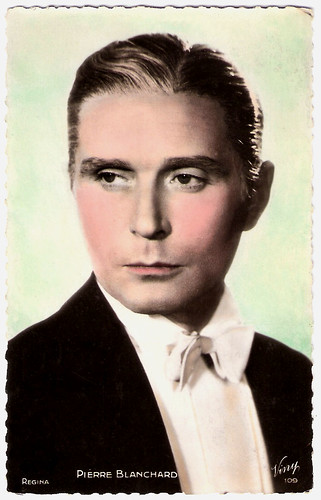
French postcard by Viny, no. 109. Photo: Regina.
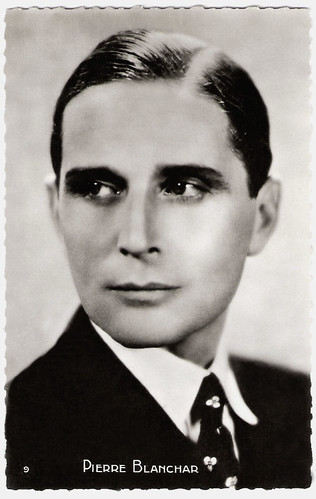
French postcard by Editions P.I., Paris, no. 9.
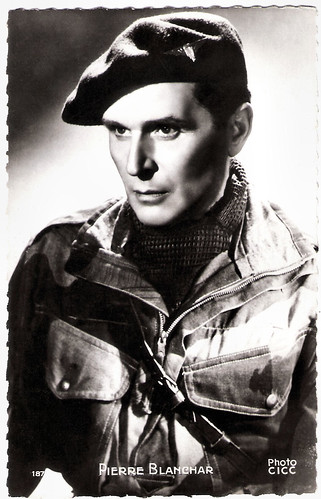
French postcard by Editions P.I., Paris, no. 187. Collection Les Carbones Korès 'Carboplane'. Photo: CICC. Pierre Blanchar in Bataillon du ciel/They Are Not Angels (Alexander Esway, 1947).
Papa Goodheart
Gustave Pierre Blanchard was born in Philippeville, Algeria (now Skikda, Algeria) in 1892.
He learned his craft at the Paris Conservatory and made the first of many memorable stage appearances in 1919 (some sources say 1920). In 1922 he made his film début in the silent film Jocelyn (Léon Poirier, 1922).
Many leading roles followed in such silent films as Papa bon cœur/Papa Goodheart (Henry Krauss, 1922), Geneviève (Léon Poirier, 1923) and Aux jardins de Murcie/Heritage (René Hervil, Louis Mercanton, 1923).
Blancharr also starred in La Terre promise/Promised Land (Henry Roussel, 1925) with Raquel Meller, Le Joueur d'échecs/The Chess Player (Raymond Bernard, 1927), and Le Capitaine Fracasse/Captain Fracasse (Alberto Cavalcanti, Henry Wulschleger, 1929) with the young Charles Boyer.
He also appeared in the German production Diane - Die geschichte einer Pariserin/Diane, the Story of a Paris Woman (Erich Waschneck, 1929) starring Olga Tschechova.
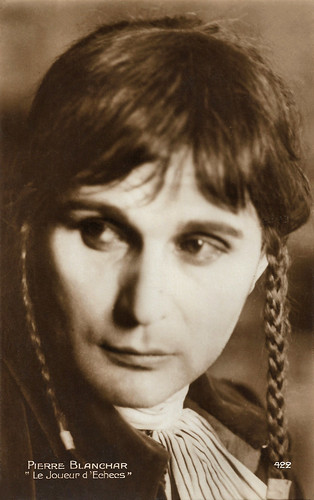
French postcard by Cinémagazine-Edition, Paris, no. 422. Photo: publicity still for Le joueur d’échecs/The Chess Player (Raymond Bernard, 1927).

French postcard by Edition Cinemagazine, Paris, no. 62. Photo: Publicity still for La Valse de l'Adieu (Henry Roussel, 1928), a biographical film on the life of composer and pianist Frederic Chopin.
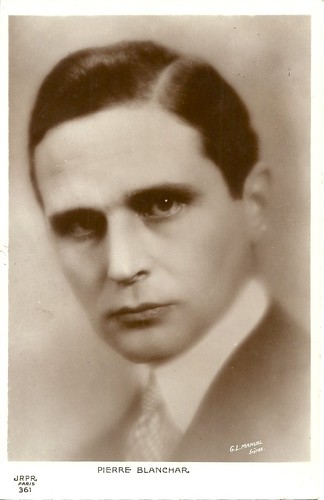
French postcard by J.R.P.R., Paris, no. 361. Photo: G.L. Manuel Frères.
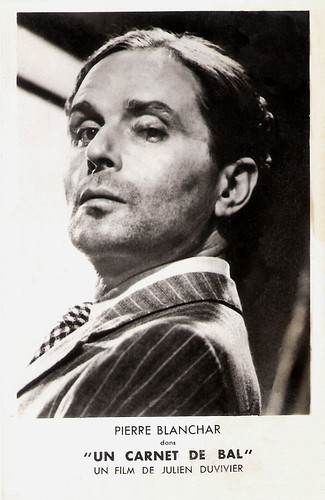
French postcard by Edition Chantal, Paris. Photo: publicity still for Un Carnet de Bal/Dance Program (Julien Duvivier, 1937).
Napoleon
Pierre Blanchar often chose to play characters which were complex and tortured, like Adjudant Gilbert Demachy in the war drama Les Croix de bois/The Wooden Crosses (Raymond Bernard, 1932) or Captain de Saint-Avit in the classic L'Atlantide (Georg Wilhelm Pabst, 1932) opposite Brigitte Helm.
At the film festival of Venice, he was awarded the Volpi Cup as Best Actor for his role as Raskolnikov in Crime et châtiment/Crime and Punishment (Pierre Chenal, 1935). Pierre Blanchar was the archetypical romantic and gloomy hero, but he did not neglect comedies, like Amants et voleurs/Lovers and Thieves (Raymond Bernard, 1935) with Arletty and Michel Simon, and Le Coupable/The Culprit (Raymond Bernard, 1937) with Madeleine Ozeray.
Other classic films of the 1930s were L’homme de nulle part/The Late Mathias Pascal (Pierre Chanal, 1937) with Isa Miranda, Mademoiselle Docteur (Georg Wilhelm Pabst, 1937) with Dita Parlo, Un carnet de bal/Dance Program (Julien Duvivier, 1937) with Marie Bell.
In 1937 he appeared also in the Alexander Pushkin adaptation La Dame de pique/Queen of Spades (Fyodor Otsep, 1937), L'Affaire du courrier de Lyon (Claude Autant-Lara, Maurice Lehmann, 1937), L'Homme de nulle part/Courier of Lyons (Pierre Chenal, 1937) with Dita Parlo, and L'Étrange Monsieur Victor/Strange M. Victor (Jean Grémillon, 1938) starring Raimu.
One of Blanchar's most famous screen characterizations was Napoleon in the British A Royal Divorce (Jack Raymond, 1938) with Ruth Chatterton as Josephine de Beauharnais.
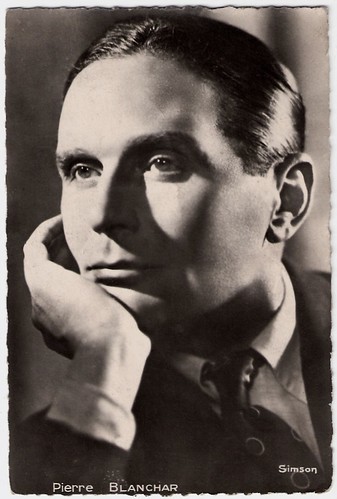
French postcard by Editions Chantal, Rueil-Malmaison. Photo: Simson.
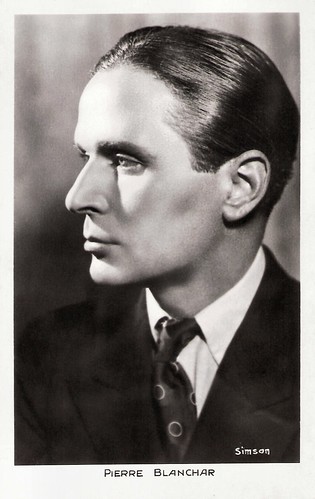
French postcard. Photo: Simson.
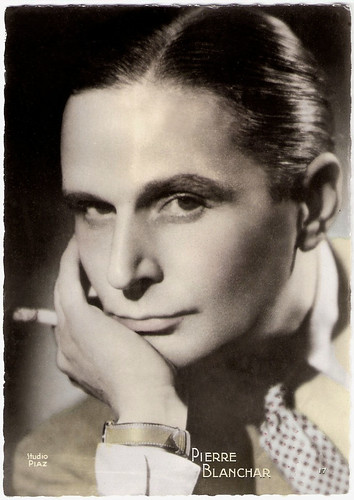
French postcard by Editions O.P., Paris, no. 17. Photo: Studio Piaz.

French postcard by Editions P.I., Paris, no. 187. Photo: Pathé Cinéma, Pierre Blanchar in Pontcarral, colonel d'empire/Pontcarral, colonel of the empire (Jean Delannoy, 1942). Collection: Geoffrey Donaldson Institute.
Resistance
Before and during the Second World War, Pierre Blanchar was often requested for French-German productions by Union France-Allemagne. During the occupation of France, he starred in L'Empreinte du Dieu/Two Women (Léonide Moguy, 1940), the never completed La Prière aux étoiles/The Prayer to the Stars (Marcel Pagnol, 1941), and Pontcarral, colonel d'empire/Piontcarral, Colonel of the Empire (Jean Delannoy, 1942).
He also directed two films, Secrets (1942) and Un seul amour/One Love (1943) with Micheline Presle and Gaby André. Later he became a member of the resistance and in August 1944 he commented vibrantly on the images of the liberation of Paris in the cinema newsreels.
After the war, he was highly praised for his touching performance in La Symphonie pastorale (Jean Delannoy, 1946) as a minister who falls in love with a blind girl (Michèle Morgan).
This success soon was followed by roles in Patrie/Homeland (Louis Daquin, 1946), and Après l'amour/After the Love (Maurice Tourneur, 1948).
Another special role was Captain Ferane in the film Le Bataillon du ciel/They Are Not Angels (Alexander Esway, 1947), based on the novel by Joseph Kessel. This role was inspired by the life and death of Pierre Marienne (1908-1944), one of the forces behind the liberation of France. As Lieutenant Paratrooper of the fourth battalion of the Spécial Air Service (S.A.S.) of the Free French Forces, he was parachuted in Bretagne on 5 June 1944 in the frame of D-Day. After taking part in the battle of Saint Marcel on 18 June 1944, he was assassinated in the Morhiban by the French army on 12 July 1944. Blanchar had known Pierre Marienne who had worked in the pre-war cinema. He also physically resembled Marienne.
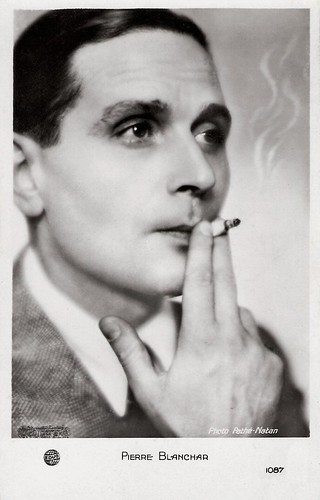
French postcard by E.D.U.G., no. 1087. Photo: Pathé / Natan.
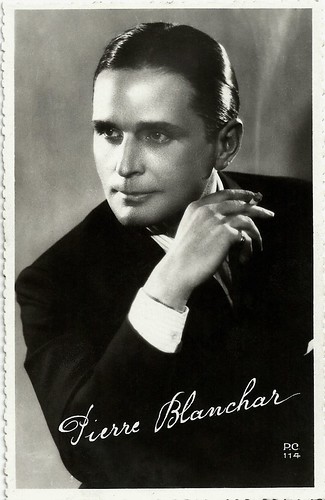
French postcard, no. 114. Photo: P.C.
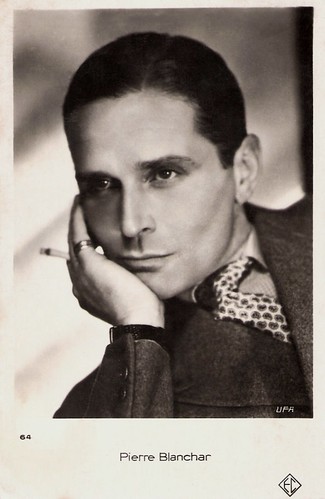
French postcard by EC, no. 64. Photo: Ufa.
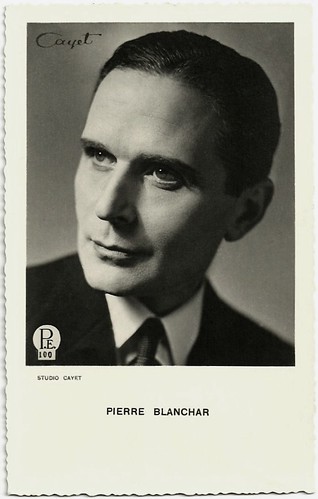
Belgian postcard by Photo Edition, Brussels, no. 100. Photo: Studio Cayet. Jo Cayet (1907-1987) was a famous Brussels-based photographer.
Long interval
Pierre Blanchar’s film career slowed down in the 1950s. After the title role of the comedy Mon ami Sainfoin/My Friend Sainfoin (Marc-Gilbert Sauvajon, 1950) there was a long interval till 1959.
That year he played supporting roles in Du rififi chez les femmes/Rififi and the Women (Alex Joffé, 1959) with Nadja Tiller.
Very popular was the fairytale Katia/Magnificent Sinner (Robert Siodmak, 1959) starring Romy Schneider.
His last film, Le Monocle noir/The Black Monocle (Georges Lautner, 1961), was shot at the château de Josselin in the Morbihan.
Pierre Blanchar died of a brain tumour in 1963, in Suresnes, France. He was married to Marte Vinot. They had a daughter, actress Dominique Blanchar.
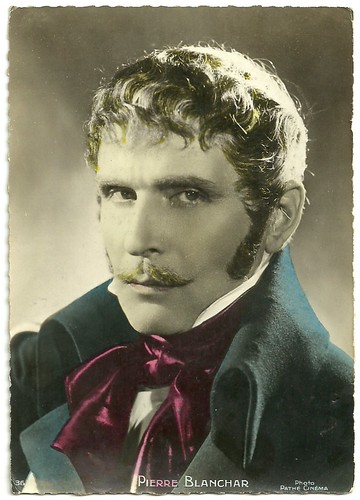
French postcard by Editions P.I., Paris, no. 36. Photo: Pathé Cinéma. Pierre Blanchar in Pontcarral, colonel d'empire/Pontcarral, colonel of the empire (Jean Delannoy, 1942).

French collectors card by Massilia. Photo: Filmsonor.
La symphonie pastorale 1 6, by Jean Delannoy.
First scenes of La Symphonie pastorale (1946). Source: jhhvideoteach (Daily Motion).
Sources: Hal Erickson (AllMovie), Wikipedia (French), and IMDb.
This post was last updated on 3 June 2023.
2 comments:
It's a coincidence, because the last week I looked a movie with Blanchar "bataillon du ciel". It' a classic movie in france.
Bye.
Thank you for visiting my blog, which led me here to fully enjoy some time reading yours.
I know little about European film stars and now I realize that I want to know more! In looking over your first page I fully enjoyed the other posts, but there was something so compelling about the photo of Pierre Blancar -- his eyes -- that caused me to stop there and immerse myself in the last two videos you provided. I feel happy now having lived for a short time in Blancar's film world. He seems truly an amazing star.
Post a Comment